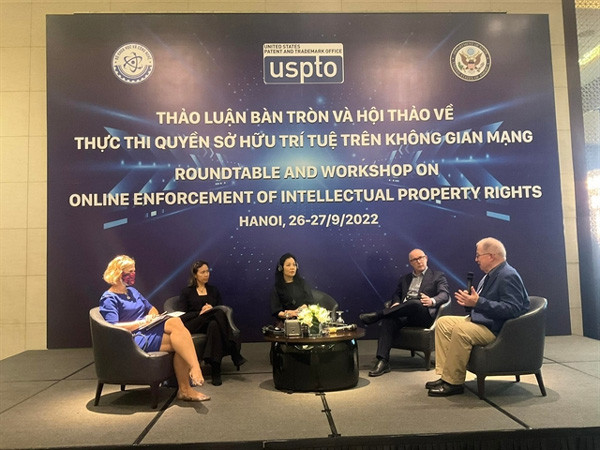
The event was co-organised by the Ministry of Science and Technology (MOST), the United States Patent and Trademark Office (USPTO), and the US Embassy in Vietnam.
The attendees include Marc Knapper, US Ambassador to Vietnam; Tran Van Tung, Deputy Minister of Science and Technology; Nguyen Quang Dung, Deputy Prosecutor-General of the Supreme People's Procuracy; and Doan Van Viet, Deputy Minister of Culture, Sports and Tourism.
"Over the past few decades, Vietnam has become a manufacturing powerhouse, but Vietnam is also important to US companies as a market," said Ambassador Knapper in his opening remarks.
"One of a company’s most important assets is always its brand: when you buy US brands, you know you’re getting a quality product," said Knapper, "This is the real cost of counterfeiting; not only do fake products direct sales away from the companies they are copying, but cutting corners and poor workmanship can erode the trust in a brand that the company has worked so hard to build."
According to Ambassador Knapper, the rise of e-commerce has added new challenges to protecting IP rights.
"Online shopping platforms can make it easier for fraudsters to ship fake consumer goods directly to customers’ homes, bypassing controls in physical marketplaces. Unlicensed software promises functionality at a cheaper price, but leaves users open to cybersecurity risks. And illegal music and video streaming sites funnel profits to criminals instead of artists and creators," said Knapper.
Knapper's opinion is also shared by Dung, who said that although Vietnam is still perfecting its legal system on IP rights, the violations still occur frequently and sophisticatedly.
"Many criminals are using technology to create counterfeits, and many piracy violators are hard to find due to the anonymity of the internet, and international law poses problems in punishing these violators," said Dung.
"We hope that Vietnam soon get the help we need from our international friends in dealing with IP violators," said Dung.
To combat IP rights violations, the National Assembly of Vietnam has already passed an amendment to the Law on Intellectual Properties in June.
The law will be in effect on January 1, 2023, but currently the Ministry of Culture, Sports and Tourism has been cooperating with related authorities to enter Vietnam into two international treaties on authors' rights.
The two treaties are the WIPO Copyright Treaty, which Vietnam have been a member since February 17, and the WIPO Performances and Phonograms Treaty, which Vietnam signed in July 1.
"We are also cooperating to build a decree on enacting the Law on Intellectual Properties in the future," said Doan Van Viet, Deputy Minister of Culture, Sports and Tourism. "Overall, Vietnam's legal system is prepared to protect copyrights, authors' rights and related rights domestically, as well as internationally."
Experts at the roundtable all agreed that to enact IP rights, especially in the digital space, Vietnam as well as its partners must work together to properly handle IP rights violators, and harsh measures should be made to prevent violations in the future.
"The US is a strong partner for Vietnam on intellectual property rights protections, and the issue draws attention from the highest levels of our leadership," said Knapper.
Source: Vietnam News